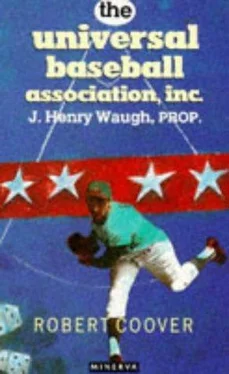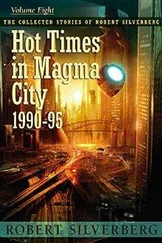Robert Coover
The Universal Baseball Association, Inc., J. Henry Waugh, Prop
It is here not at all requisite to prove that such an intellectus archetypus is possible,
but only that we are led to the Idea of it…
— Kant, Critique of Judgment
BOTTOMhalf of the seventh, Brock's boy had made it through another inning unscratched, one! two! three! Twenty-one down and just six outs to go! and Henry's heart was racing, he was sweating with relief and tension all at once, unable to sit, unable to think, in there, with them ! Oh yes, boys, it was on! He was sure of it! More than just another ball game now: history ! And Damon Rutherford was making it. Ho ho! too good to be true! And yes, the stands were charged with it, turned on, it was the old days all over again, and with one voice they rent the air as the Haymaker Star Hamilton Craft spun himself right off his feet in a futile cut at Damon's third strike — zing! whoosh! zap! OUT ! Henry laughed, watched the hometown Pioneer fans cheer the boy, cry out his name, then stretch — not just stretch— leap up for luck. He saw beers bought and drunk, hot dogs eaten, timeless gestures passed. Yes, yes, they nodded, and crossed their fingers and knocked on wood and rubbed their palms and kissed their fingertips and clapped their hands, and laughed how they were all caught up in it, witnessing it, how he was all caught up in it, this great ball game, event of the first order, tremendous moment: Rookie pitcher Damon Rutherford, son of the incomparable Brock Rutherford, was two innings — six outs — from a perfect game! Henry, licking his lips, dry from excitement, squinted at the sun high over the Pioneer Park, then at his watch: nearly eleven, Diskin's closing hours. So he took the occasion of this seventh-inning hometown stretch to hurry downstairs to the delicatessen to get a couple sandwiches. Might be a long night: the Pioneers hadn't scored off old Swanee Law yet either.
A small warm bulb, unfrosted, its little sallow arc so remote from its fathering force as to seem more akin to the glowworm than lightning, gleamed outside his door and showed where the landing ended; the steps themselves were dark, but Henry, through long usage, knew them all by heart. Cold bluish streetlight lit the bottom, intruding damply, seeming to hover unrelated to the floor, but Henry hardly noticed: his eye was on the game, on the great new Rookie pitcher Damon Rutherford, seeking this afternoon his sixth straight win. . and maybe more. Maybe: immortality. And now, as Henry skipped out onto the sidewalk, then turned into the front door of Diskin's Delicatessen, he saw the opposing pitcher, Ace Swanee Law of the hard-bitten Haymakers, taking the mound, tossing warm-up pitches, and he knew he had to hurry. "Two pastrami, Benny," he said to the boy sweeping up, Mr. Diskin's son — third or fourth, though, not the second. "And a cold six-pack."
"Aw, I just put everything away, Mr. Waugh," the boy whined, but he went to get the pastrami anyway.
Now Swanee Law was tough, an ace, seven-year veteran* top rookie himself in his own day, one of the main reasons Rag Rooney's Rubes had finished no worse than third from Year L through Year LIV. Ninety-nine wins, sixty-one losses, fast ball that got faster every year, most consistent, most imperturbable, and most vociferous of the Haymaker moundsmen. Big man who just reared back and hummed her in. Phenomenal staying power, the kind old Brock used to have. But he didn't have Brock Rutherford's class, that sweet smooth delivery, that virile calm. Mean man to beat, just the same, and to be sure he still had a shutout going for him this afternoon, and after all, it was a big day for him, too, going for that milestone hundredth win. Of course, he had a Rookie catcher in there to throw to, young Bingham Hill, and who knows? maybe they weren't getting along too well; could be. Law was never an easy man to get along with, too pushy, too much steam, and Hill was said to be excitable. Maybe Rooney had better send in reliable old Maggie Everts, Law's favorite battery mate. What about it? Haymaker manager Rag (Pappy) Rooney stroked his lean grizzly jaw, gave the nod to Everts.
"How's that, Mr. Waugh?"
"Did you put the pickle?"
"We're all out, sold the last one about thirty minutes ago."
A lie. Henry sighed. He'd considered using the name Ben Diskin, solid name for an outfielder, there was a certain power in it, but Benny spoiled it. A good boy, but nothing there. "That's okay, Benny. I'll take two next time."
"Working hard tonight, Mr. Waugh?" Benny rang up the sale, gave change.
"As always."
"Better take it easy. You been looking a little run-down lately."
Henry winced impatiently, forced a smile. "Never felt better," he said, and exited.
It was true: the work, or what he called his work, though it was more than that, much more, was good for him. Thing was, nobody realized he was just four years shy of sixty. They were always shocked when he told them. It was his Association that kept him young.
Mounting the stairs, Henry heard the roar of the crowd, saw them take their seats. Bowlegged old Maggie Everts trundled out of the Haymaker dugout to replace Hill. That gave cause for a few more warm-up pitches, so Henry slowed, took the top steps one at a time. Law grinned, nodded at old Maggie, stuffed a chaw of gum into his cheek. In the kitchen, he tore open the six-pack of beer, punched a can, slid the others into the refrigerator, took a long greedy drink of what the boys used to call German tea. Then, while Law tossed to Everts, Henry chewed his pastrami and studied the line-ups. Gram-mercy Locke up for the Pioneers, followed by three Star batters. Locke had been rapping the ball well lately, but Pioneer manager Barney Bancroft pulled him out, playing percentages, called in pinch-hitter Tuck Wilson, a great Star in his prime, now nearing the end of his career. Wilson selected a couple bats, exercised them, chose one, tugged his hat, and stepped in.
Henry sat down, picked up the dice, approved Everts' signal. "Wilson batting for Locke!" he announced over the loudspeaker, and they gave the old hero a big hometown hand. Henry rolled, bit into pastrami. Wilson swung at the first pitch, in across the knuckles, pulling it down the line. Haymaker third-sacker Hamilton Craft hopped to his right, fielded the ball, spun, threw to first— wide! Wilson: safe on first! Henry marked the error, flashed it on the scoreboard. Craft, one of the best, kicked the bag at third sullenly, scrubbed his nose, stared hard at Hatrack Hines, stepping now into the box. Bancroft sent speedster Hillyer Bryan in to run for Wilson.
"Awright! now come on, you guys! a little action!" Henry shouted, Bancroft shouted, clapping his hands, and the Pioneers kept the pepper up, they hollered in the stands.
"Got them Rubes rattled, boys! Let's bat around!"
"Lean into it, Hatrack, baby! Swanee's done for the day!"
"Send him down the river!"
"Dee-ee-eep water, Swanee boy!"
"Hey, Hatrack! Just slap it down to Craft there, he's all butter!"
The dice rattled in Henry's fist, tumbled out on the kitchen table: crack! hard grounder. Craft jumped on it this time, whipped the ball to second, one out — but young Bryan broke up the double play by flying in heels high! Still in there! Bancroft took a calculated risk: sent Hatrack scampering for second on Law's second pitch to Witness York— safe! Finishing his sandwich, Henry wondered: Would the Rookie Bingham Hill, pulled for inexperience, have nailed Hines at second? Maybe he would have. Pappy Rooney, the graybeard Haymaker boss, spat disdainfully. He knew what he was doing. Who knows? Hill might have thrown wild.
Читать дальше












